What We Can Learn from the Homeschooled 2002 National Geography Bee Winners
By Mary Pride
Printed in Practical Homeschooling #48, 2002.
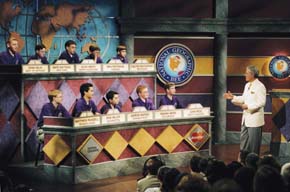 These kids really know geography. So what methods did they and their parents use that let them beat nearly five million other kids?
These kids really know geography. So what methods did they and their parents use that let them beat nearly five million other kids?

|
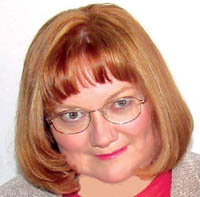 |
|
Photo by Rebecca Hale © National Geographic Society |
|
 |
|
The top 10 finalists in the 2002 National Geographic Bee listen as moderator Alex Trebek gives opening instructions, May 22, at National Geographic Society headquarters in Washington, D.C. The 10 finalists were selected from a field of 55 state winners during preliminary rounds the previous day.
|
|
On May 22, 2002, ten nervous kids between the ages of 10 and 14 headed into the final round of the National Geography Bee.
And four of them were homeschoolers!
Sponsored each year by the National Geographic Society in the hopes of improving schoolkids' geography knowledge, the 2002 National Geography Bee attracted nearly five million entrants.
Through the rounds of local "school" competitions, written questions, and state competitions, the field was narrowed down to 55 competitors: one for each state of the USA and each U.S. territory. Grueling rounds of national competition further whittled that number down to the ten you see in the photo above. The final round reduced that number until finally only two contestants were left: 14-year-old Matthew Russell, a public schooled eighth grader, and 10-year-old Calvin McCarter, a homeschooled fifth grader.
After the last written question, Matthew graciously rose to his feet to congratulate the much smaller Calvin on his victory, making this the second time a homeschooler has won the Geo Bee. (David Biehl was the first homeschooled Geo Bee champion, in 1999.)
|
| Watch & Learn! |
See the 2002 National Geographic Bee final rounds for yourself online at nationalgeographic.com. You can also see the Bee finals for 2001 and 2000. To view any of these, you will need Real Media Player, a video-viewing application available free online. Sadly, I couldn't locate the 1999 finals online, to see homeschoolers David Biehl's winning performance.
|
|
|
If you watch this year's webcast (see how to do this in the box to the right), you will see host Alex Trebek of TV's Jeopardy show kicking off the show by noting how many of the finalists were homeschooled and commending their parents for all their hard work and dedication. This shows that not only is Mr. Trebek an open-minded and gracious individual, but that homeschoolers are gaining serious respect by their performance in these national academic competitions.
But I wanted to know about the parts they didn't show on TV or the Web. How did these kids prepare for the Bee? What was special about them? Are they like other homeschooled students, or a breed apart?
| Photo by Mark Thiessen © National Geographic Society |
|
|
 |
|
Calvin McCarter, 10, of Jenison, MI, is interviewed by the media immediately after his victory at the 2002 National Geographic Bee. Calvin, the youngest contestant ever to win the Bee, received a $25,000 college scholarship and lifetime membership in the National Geographic Society.
|
|
Calvin McCarter
Geo Bee winner Calvin McCarter and his older brother David Parnell have been homeschooled since kindergarten. D. Parnell, (he goes by his middle name "Parnell" just like his dad Joseph Parnell) is 12 years old. Both he and Calvin have competed in the National Geographic Bee. For the year 2002 they competed against each other on the "school" level. D. Parnell placed second. Calvin was first and therefore had the opportunity to proceed to the next level of competition.
Like the other top participants, from a very early age Calvin had the gift of recalling details of experiences and lessons from the past. In his case, this gift was particularly noticeable. Mom Charlotte recalls, "For example, as a preschooler Calvin would remember even the small details of events which occurred one or two years earlier."
Calvin's mom admits she was not very good in geography in school and as a schoolchild she did not think it was important. "That hurt me a lot in the study of history and in appreciating current events," she says. "I did not want the same thing to happen to my children, so from the time they were little, whenever we would read books and came across names of places, I would ask my older son to look for it on a map. Remember, I myself did not know where they were and I let my sons know that. We all learned together."
|
Photo by Mark Thiessen © National Geographic Society |
|
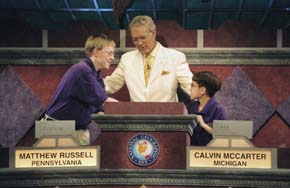 |
|
Moderator Alex Trebek looks on as Calvin McCarter [right], winner of the 2002 National Geographic Bee, is congratulated by second-place runner-up Matthew Russell, 14, of Bradford, PA. Calvin correctly answered the question, "Lop Nur, a marshy depression at the east end of the Tarim Basin, is a nuclear test site for which country?" (Answer: China.)
|
|
Charlotte, who is originally from the Philippines, did not use any curriculum or any special materials to teach geography. "Our family does not even own a globe!" she explained. "The atlas we had was an old one I got as a freebie when I joined a book club after I came to this country. The world map we had was another freebie received from a bank in 1990, before Calvin was even born. When he won the state championship here in Michigan, one of his prizes was The National Geographic Atlas of the World, 7th edition. He referred to it a lot to prepare for the national finals." Like most other finalists, the McCarters also used the public libraries a lot.
Calvin got interested in geography because of his older brother. D. Parnell liked looking over the maps in their old atlas. Even before Calvin could read, D. Parnell would show general areas on the map to him. In this way, his brother became his first geography teacher.
Since National Geographic does not recommend any specific resources for preparing for the nationals, Charlotte did a search of the geography books available at the public libraries. She reviewed and skimmed through them and noted the sections that she believed were worth studying. Then, Calvin read them and she quizzed Calvin on those materials.
Far from concentrating on just one subject (geography), the McCarters have always insisted that their children receive a well-balanced and well-rounded education. Even in the midst of the Geo Bee competitions Calvin continued his work in the other school subjects. In fact, his parents told him he wouldn't be allowed to compete unless he did a certain amount of required work in subjects other than geography! To make the extra time for Bee preparation, Calvin decided to forego indoor soccer during the winter, and just play soccer in the fall and spring.
The McCarters employ an eclectic approach to their children's education, signing their kids up for various courses and programs offered for children through the local public university and the local homeschool support group, as well as gathering textbooks and other resources from a variety of sources. In their case, the emphasis is on providing a distinctively reformed Christian education. They have already taken this one step further, as they seek to develop what they call "The Puritan's Home School Curriculum." Portions of this are already available at www.puritans.net. Their goal is to eventually provide an entire Reformed curriculum online, "designed from the perspective of the historic reformed Christian faith, as reflected in the original Westminster Standards and Three Forms of Unity." To those of you from outside this religious tradition who aren't familiar with these terms or documents, they're talking about good old-fashioned Calvinistic Presbyterianism.
For the McCarters, "Bee participation has given our family the opportunity to testify of our reformed Christian faith and of the importance of distinctively reformed Christian education. It has also encouraged us in the study of geography and geography-related subjects."
The extent to which they got this message out in the mass media varied. "It was especially difficult if not impossible to get our Christian testimony out through the TV media," Calvin's dad Joseph said. "We found they choreographed much of what aired. In some programs Calvin was simply able to mention his thanks to God in a brief comment. Some TV news edited our interviews so much that it even distorted our message." The radio media let Calvin share more, generally because they conducted live interviews. On one PBS station he was able to mention how his education was distinctively Christian, and that he preferred that because he disagrees with the evolutionary view taught in public schools.
Calvin's Christian testimony came out most clearly in the print media. "In a major article covering Calvin, our local newspaper did explain that his education was distinctively Christian," Joseph said. However, the bottom line was that secular media did not let the McCarters say what they wanted to say nearly as much as Christian media. To Joseph, "That just shows the importance of professedly Christian media, and even Reformed Christian media!"
|
Photo courtesy nationalgeographic.com |
|
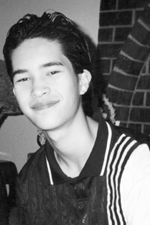 |
|
Third Place: Erik Miller
Answering a split-second too late - so close to the buzzer that the judges had to stop the competition and review the tapes - knocked Erik Miller, 14, of Kent, Washington, out of the top two. However, he still got to take home a $10,000 scholarship check. That's a pretty good start on his college fund!
Gia Miller, Erik's mom, has been homeschooling him and his siblings about five years. She told me Erik has been interested in geography since the age of 7, and that he started by "constantly reading maps of all types."
The Millers only found out there even was a National Geography Bee last year, when Gia saw a picture of a kid from Erik's track team in their local newspaper. Last year, Erik's first year, he placed ninth in the state Bee.
To prepare for the Geography Bee, Erik used "atlases, almanacs, radio (for news around the world), and websites with sample questions." Erik has many other interests, including Track & Field (he placed second for the 100 meter event in this year's Washington state championship), Select Soccer, and Youth Orchestra for Violin and Piano. Erik also has a full homeschool program, including language arts, math (with a bit of calculus this year), biology, U.S, history, and of course art and music.
Originally Gia hoped that Geo Bee competition would help Erik gain confidence. Now she says, "It has come to have more effect than that" on their whole family. Like other Geo Bee parents, she mentioned the opportunity to meet all those smart kids from other states. One Geo Bee tradition she particularly enjoyed was the state souvenir swap. "I gathered the pins and such Erik collected and placed them on display."
"Competitions don't make you who you are, she continued. "But they're great for challenging your self and getting together with kids with the same interest! Overall the experience was wonderful. The staff at National Geographic was generous and gracious. I am grateful such a program exists."
| Photo courtesy nationalgeographic.com |
|
|
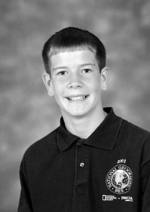 |
|
Fourth Place: John T. Rice
John Rice, 14, of North Dakota came in fourth this year . . . for the second time! He is the oldest of five children. He and his siblings have been homeschooled for eight years.
I interviewed both his dad, John Rice, Sr., and his mom, Barb. To avoid confusion, I'll refer to the Geo Bee finalist as "JT," and his dad as "John," for the remainder of this article.
JT has made the big trip to the National Geo Bee in Washington four times. The first year he tied for fourth or fifth place at the national level, as a sixth-grader. The second year he was at nationals again, but missed one question and didn't get into the top ten. Now he hopes to qualify for the International Geography Olympiad.
|
| What Is a Geography Bee Competition Like? |
| In the interests of removing any "fear factor" that may be hindering a PHS reader from entering their child in the National Geography Bee, we asked the parents of homeschooled Geo Bee finalists to share their "insider" view of the competition, from the local ("school") level all the way to the Battle of the Brains in Washington, D.C.
Evelyn Hess, Isaiah's mom, told us, "At the school level, you start with three rounds where there are two choices. Then they ask I believe it's four more questions where you have to produce the answers. They always have some sort of graph or chart that they put up on the overhead projector and ask questions. One year it was a weather map: "What kind of weather is Dallas having today?" You'd have to know where Dallas is and how to read a weather map.
"The ten children with the highest scores go to the final round. They just keep asking the kids questions. They have to produce the answers until they miss two questions and are knocked out. When they get down to two, it's the Championship Round. Each kid is asked the same three questions, and they write their answers down.
"After the school level, if you're still in the running you take a written test. The top 100 scorers for your state go to the state Bee.
"Any time from Thanksgiving to February 1 a school can have a Geo Bee. You can get together six homeschoolers to have a school bee. Just send away for the packet!"
John Rice, Sr., had this to say: "If you make it to the national level, the National Geographic Society will pay for a ticket for the student and the teacher, so that's a good start. Of course, they provide a couple of tickets to the event itself, and you can request more.
"People need to realize the contests are never perfect and they're never totally fair because of the variability of questions. There's a tremendous amount of joy and of sorrow in those two days because you start out with 55 students and 45 of them get eliminated the first day. Oftentimes the kids who get eliminated are just a question or two away from the top ten. So it's a real heartbreaker for the kids, the parents, and the teachers. After that first day, they have a picnic out in the countryside with volleyball and basketball and miniature golf and barbecue, and they bunk the kids together in hotel rooms. So the kids get a chance to meet other people and mix. This helps the kids forget that they're not going to be in the contest tomorrow. It helps them loosen up again.
"They take each student beforehand and let him know if he has to talk louder (or whatever), how to do an interview, how to use the full 20 seconds to answer the question without jumping to a conclusion.
"A big part of the Bee is strategy and logistics. You have the chance to get a couple of questions restated. If you didn't hear it right, a lot of times if they ask it again you might get a better idea.
"Grace under pressure is important. Because of the time limits on the questions, these kids have to respond fast and accurately. No buck fever ("deer in the headlights" reaction).
"As a father, I learned more the second year when we didn't make the top 10. I learned how 45 fathers felt. The first year I only knew how 10 fathers felt."
|
|
|
According to John, JT always had a natural interest in geography. He started looking at maps when he was just past toddlerhood.
Barb Rice notes that the only geography curriculum per se that they used was A Beka's World Geography in fifth grade. They also played Audio Memory's Geography Songs a lot when JT was younger. "We'd point at the countries and sing about them," she says. "He's devoured every atlas, every history book, everything he could get hold of for reading about geography, history, and physical science."
National Geographic magazine, the National Geographic Desk Reference JT won as a prize one year, and National Geographic's Exploring Your World were a big help to them. "Your World is an excellent book," Barb enthuses. "It has just a little blip on each country. But it's all the stuff you need to know. It's out of print, but you can find it at the library and at used bookstores." In addition, JT has read just about every G.A. Henty book, so he's pretty good at historical geography.
John hastens to add, "Another thing that is very important is reading the newspapers and clipping and cutting the current events about floods and volcanoes and tornadoes - anything pertaining to geography could be a question at the Bee.
"Mainly you need to do a lot of reading. There's so much geography in the newspapers and in stories and in classical novels and nonfiction.You really need to study it an hour or two a day, to go to Washington.
I asked John if he had any other tips for potential Geo Bee parents. "I would encourage them to give their children a good taste of geography long before they're sixth graders," he replied. "If they enjoy it and they like it, then follow through and provide them with maps. Most of these kids at the national level are self-starters, but they still need guidance and materials."
Like other Geo Bee parents, John waxes lyrical about the benefits to the competitors. "It's been a marvelous experience. JT emails these kids all over the United States; he's made friends. In some areas, he's now ten years ahead of himself."
| Photo courtesy nationalgeographic.com |
|
|
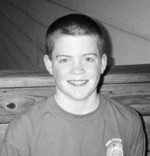 |
|
Sixth Place: Isaiah Hess
Of all this year's top homeschooled finalists, the "homeschool through geography" program of sixth-place finisher Isaiah Hess was the most original.
Like other Geo Bee finalists, Isaiah showed signs of unusually strong memory abilities. As his mom Evelyn relates, "About three years ago. Isaiah had been part of a program at our church called Bible Quiz. The children memorize verses and are asked questions about doctrine. They had a set of over 500 cards that the child was supposed to learn the responses to. Really advanced children were supposed to learn the questions and the answers. I was so shocked that in three months he'd memorized all of it." They then decided to let him try the Geography Bee, since he was interested in becoming a missionary.
The Hesses began by listening to a program called "Mission Network News" out of Michigan that does a daily 5-minute broadcast on what's happening around the world in missions. "We would listen to the broadcast, then look up those countries on the map and pray for those people. Through our church we began to receive letters from missionaries."
Isaiah began three notebooks two years ago. One notebook was the maps of all the 50 states and a page of cultural information on each state. The second notebook was international maps: a map of each country and a page of cultural items about that country. The third was developing his own dictionary - harder words that he would come across either in a newspaper article or a book.
Then this past year he tackled terminology more, using the A Beka History and Geography books for fifth and sixth grade. "That was a great collection of books because they have a good solid foundation of geography terms," Evelyn remarks. This served to get him to the state level.
The Hesses used the library heavily. "In the past two years we've checked out over 1,000 books and videos," Evelyn reports. "We started with the United States, because if you do the Geo Bee on the school level, I'd say maybe 40 percent of it has to do with the United States."
Evelyn was careful to screen all those library books and videos. "I was surprised how often the travel videos would bring up a bar scene or visit the red-light district," she warns.
Like the Rices, Mrs. Hess is enthusiastic about the out-of-print Exploring Your World: The Adventure of Geography, published by National Geographic. She also recommends the Childcraft volume entitled Whole Wide World, Modern Curriculum Press's Map, Charts, and Graphs series, the Dorling Kindersley book Geography of the World, as well as the six-volume Lands and People series by Grolier Publishing. "We got ours for $100 because it was a year old. It's a great collection. It goes into every country. If a child is as thorough as Isaiah is, they could read through those volumes, map the countries, and come away with about as much knowledge as he has," she says.
Evelyn stresses the importance of always looking up the pronunciations. "We got a geography dictionary that listed about 3,000 places and gives their pronunciation. Children at the state and national level sometimes didn't know what the moderator was asking because the moderator was saying it correctly. E.g., "Dan - u - BE" for Danube."
Evelyn also spent time praying with Isaiah about directing his studies, "because there is so much they can draw from when asking the questions."
Besides basic facts about geographic places, to have Geo Bee success you have to learn about earth science in great detail. Evelyn found those words in a college-level earth science course.
Mr. Hess gets geography questions off the Internet (one source: www.nationalgeographic.com/geobee/)and brings them home. He asks the question, and lets each child give his guess. They also bought a Geosafari Talking Globe that asks 10,000 questions. It's no surprise that, as Evelyn reports, "The little ones have been eager to be part of that with him."
As far as preparation for the competition goes, Isaiah did a lot of the drawing of the maps and reading on his own. Studying the terms took a lot of his mom's time. Six weeks before the state and six weeks before the school meet, she began to review with him. She says, "Basically any time I could get when I wasn't diapering someone or feeding the family or something like that, I was spending time with Isaiah."
Like other finalists, Isaiah is really glad he did the Geo Bee. The process was a turning point in his life. Until two years ago, it was very hard for him to give up playtime in order to study. Being the oldest, he always had more schoolwork than the rest, and would be looking wistfully out the window wishing he was playing with them. When he got the bug about mapping every country, he gladly gave up playtime to work. He really wanted to work! His parents are really pleased to see the self-discipline that came out of this process. It also ignited an interest in geography for the younger children. Evelyn says, "My kids now cannot wait to study geography. Isaiah will be their teacher; he knows far more about geography than I do!"